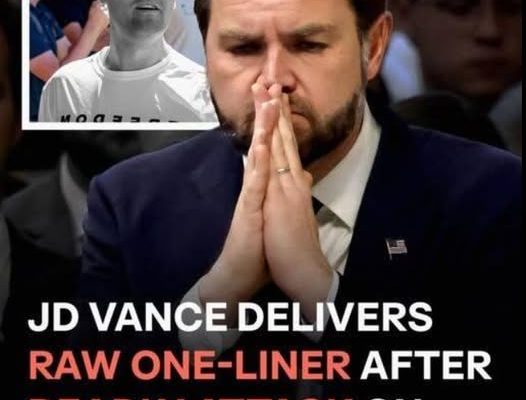The nation is reeling from the shocking death of Charlie Kirk, the 31-year-old founder of Turning Point USA (TPUSA), who was fatally shot during a speaking engagement at Utah Valley University (UVU). Kirk, known for his sharp commentary and ability to mobilize young conservatives, was addressing a packed audience when chaos erupted.
What was supposed to be a routine campus discussion ended in tragedy as gunfire rang out, sending students, faculty, and attendees scrambling for cover. Within seconds, the event hall became a scene of panic. Witnesses described people ducking under chairs, shielding each other, and rushing toward exits as security shouted for everyone to stay down.
Campus security immediately initiated lockdown procedures, sealing off classrooms and directing students to shelter in place while law enforcement swarmed the area. Helicopters hovered overhead as tactical units swept through the campus. UVU officials suspended all classes for the day, prioritizing safety as the investigation unfolded.
Initial reports suggested that a suspect had been taken into custody, but those early claims were later clarified. University officials confirmed that one individual was questioned and then released. No official arrests have been announced, and authorities have urged the public to avoid jumping to conclusions while the investigation remains ongoing.
The Investigation
Federal officials are now coordinating closely with state and local law enforcement to piece together what happened. Teams of investigators are analyzing eyewitness accounts, reviewing hours of video footage from students’ phones and security cameras, and combing through forensic evidence left at the scene.
Officials have emphasized that no motive has been established. While speculation has circulated online, authorities have declined to release details about potential suspects or threats, stressing the importance of accuracy in such a sensitive case. “We will not fuel rumors,” one federal spokesperson stated. “Our responsibility is to deliver facts.”
The FBI and Department of Homeland Security have joined state investigators in Utah, underscoring the seriousness of the case. Forensic teams are reconstructing the sequence of events leading up to the shooting, including how the weapon was brought into the venue and whether there were missed warning signs.
Reaction from Turning Point USA
Turning Point USA, the conservative organization Kirk founded at just 18, quickly released a statement confirming his death. The group described him as having “gone to his eternal reward” and highlighted his pivotal role in building one of the most influential youth political movements in the country.
“He gave a generation of young conservatives a voice,” the statement read. “His courage, determination, and vision changed the national conversation. Today, we grieve not just for our founder, but for a friend, mentor, and leader who dedicated his life to America’s future.”
Within hours, TPUSA supporters across the nation began organizing memorials. On campuses in multiple states, students gathered with candles, carrying signs that read “Thank You Charlie” and “Ideas Live On.” Online, hashtags honoring him trended globally as tributes poured in from both admirers and critics who nevertheless acknowledged his outsized influence on political debate.
A Divisive but Influential Figure
Kirk was no stranger to controversy. His outspoken commentary frequently sparked heated debates on college campuses and in the media. To his supporters, he was a bold truth-teller, unafraid to challenge what he viewed as cultural and political orthodoxy. To critics, he was a polarizing provocateur whose rhetoric fueled division.
Yet regardless of political stance, few disputed his ability to connect with young audiences. Through rallies, social media, and TPUSA events, Kirk mobilized thousands of students and encouraged conservative engagement at a time when many felt alienated from mainstream discourse.
“He changed the way youth politics function in America,” one political analyst noted. “Whether you agreed with him or not, Charlie Kirk tapped into something real, and his impact will be felt for years to come.”
Bipartisan Condolences
Perhaps the most surprising reaction to Kirk’s death has been the breadth of sympathy expressed. Leaders from both major political parties issued statements condemning the act of violence and offering condolences to his family.
A prominent Republican senator described him as “a warrior for conservative values, taken too soon,” while a leading Democrat emphasized that “political violence has no place in our country. Today we mourn, not as partisans, but as Americans who value life, discourse, and democracy.”
The bipartisan response underscored the seriousness of the tragedy. Regardless of ideology, Kirk’s death has reignited urgent discussions about political polarization, public safety, and the importance of protecting civic spaces from violence.
A Campus in Mourning
At Utah Valley University, the mood remains somber. Students have created a memorial at the site of the shooting, leaving flowers, handwritten notes, and American flags. Faculty have offered counseling services for traumatized students, and university leadership has pledged to review campus security protocols.
“This is not who we are,” UVU’s president said in a press conference. “Our campus should be a place of dialogue, not violence. We extend our deepest condolences to Mr. Kirk’s family and to everyone impacted by this horrific act.”
Many students who were present at the event remain shaken. One attendee described the moment gunfire erupted: “It didn’t feel real. One minute he was speaking, the next there was screaming everywhere. I thought I wasn’t going to make it out.”
Awaiting Answers
As the investigation continues, the nation waits for clarity. Was Kirk targeted because of his political views, or was the attack motivated by something else entirely? Was it premeditated or spontaneous? Authorities have promised transparency once facts are confirmed, but for now, the lack of answers has left the public restless.
What is certain is that Charlie Kirk’s death marks a turning point. For his supporters, it is a devastating personal loss and a rallying cry to continue his mission. For his critics, it is a sobering reminder that violence can shatter even the fiercest debates. For the nation as a whole, it is an alarming signal that political discourse, already fraught with tension, must be defended from escalating into bloodshed.
A Nation Reflects
In the days since the shooting, Americans have gathered not just to grieve but to reflect. Editorials in major newspapers have called for renewed commitments to civil dialogue. Faith leaders have led prayers for peace and healing. On college campuses, students have organized forums on safety, free speech, and tolerance.
Charlie Kirk’s voice has been silenced, but the conversation he helped ignite continues. His legacy—whether viewed with admiration or criticism—cannot be denied. He leaves behind an organization that shaped a generation of conservative activism, a family grieving his loss, and a country once again forced to confront the consequences of political violence.
As investigators work toward answers, one truth is already clear: the loss of Charlie Kirk at just 31 years old is a tragedy that transcends politics. It is a reminder of life’s fragility, the importance of dialogue, and the urgent need to protect those who step into the public arena, regardless of ideology.
For now, America waits—for justice, for clarity, and for the hope that out of this darkness might come a renewed commitment to civility, compassion, and safety in public life.



